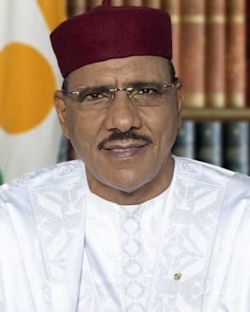Niger - President Mohamed Bazoum
 President of the Republic of Niger since April 2, 2021, before becoming President, Mohamed Bazoum served as the President of the Nigerien Party for Democracy and Socialism. Mohamed Bazoum was born in 1960 in Bilabrine near N'Gourti in the Diffa region. He is married to Hadiza Mabrouk and is the father of four children.
President of the Republic of Niger since April 2, 2021, before becoming President, Mohamed Bazoum served as the President of the Nigerien Party for Democracy and Socialism. Mohamed Bazoum was born in 1960 in Bilabrine near N'Gourti in the Diffa region. He is married to Hadiza Mabrouk and is the father of four children.
A philosopher by training, from 1979 to 1984 he was at the faculty of letters and human sciences in the philosophy department of the University of Dakar before obtaining a master's degree in political and moral philosophy and then a diploma in studies (DEA), logic and epistemology option.
After student life, he joined the trade union activities of the National Union of Teachers of Niger (SNEN) then joined the executive office of the Trade Union of Workers of Niger (USTN) which he moreover represented at the National Conference in 1991.
He has held several ministerial posts, notably that of Minister of the Interior from April 2016 to June 2020 and Minister of State and Minister of Foreign Affairs for Cooperation from 2011 to 2015. He was also elected four times as a deputy (1993 , 2004, 2011 and 2016) from the special constituency of Tesker (Zinder) and several times Vice-President of the National Assembly and President of the PNDS-Tarayya parliamentary group.
Mohamed Bazoum was also a member of the transitional parliament from 2010 to 2011 and secretary of state to the Minister of Foreign Affairs and Cooperation in charge of cooperation from 1991 to 1993 during the post-national conference democratic transition.
The presidential elections were held on 27 December 2020. President Mahamadou Issoufou did not stand for re-election, respecting the constitutional rule of two terms. His party's candidate, Mohamed Bazoum, is the favorite according to most polls. The election campaign has been marked by the decisions of the Constitutional Court, which had rejected the candidacy of the main opposition leader and validated the candidacy of the ruling party. Both decisions have been questioned.
The questioning of the validity of his candidacy is due to doubts about his nationality. Article 47 of the Constitution states that Nigerian nationality is required to become President. The Constitutional Court ruled that doubts about Bazoum's nationality were unfounded and therefore there was no problem with his eligibility.
Niger's recent political history is marked by four coups d'Útat, the last one in 2010. The other candidates who are also running include General Salou Djibo, who was the head of the military junta and was in power after the 2010 coup d'Útat until the elections won by the current president; Mahamane Ousmane, who was president of Niger from 1993 to 1996, and Se´ni Oumarou, leader of the National Movement for the Society of Development (MNSD), who came third in the 2016 elections, among others.
Mohamed Bazoum was an important western ally in the fight against a spreading jihadist insurgency in the Sahel region and had also co-operated with the EU in stemming the flow of people who use Niger as a transit country on their journey towards Europe. Agadez, the trading metropolis on the southern edge of the Sahara, according to Olaf Bernau "provided services for the more than 100,000 transit migrants each year, i.e. transport, accommodation or food. A total of around 9,000 people are said to have lost their livelihoods, some even ended up in prison."
|
NEWSLETTER
|
| Join the GlobalSecurity.org mailing list |
|
|
|

